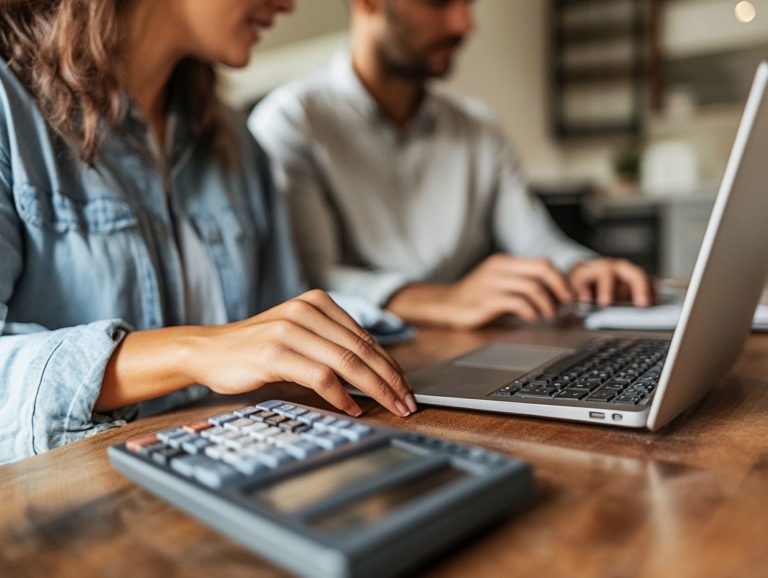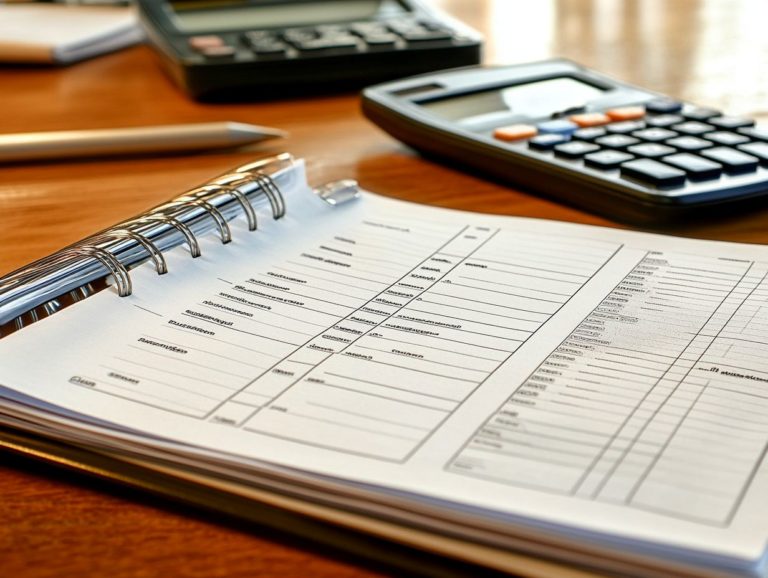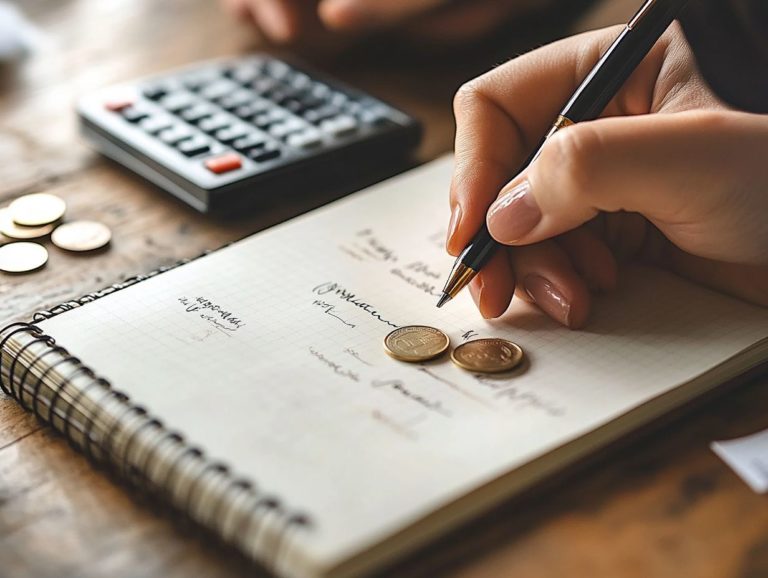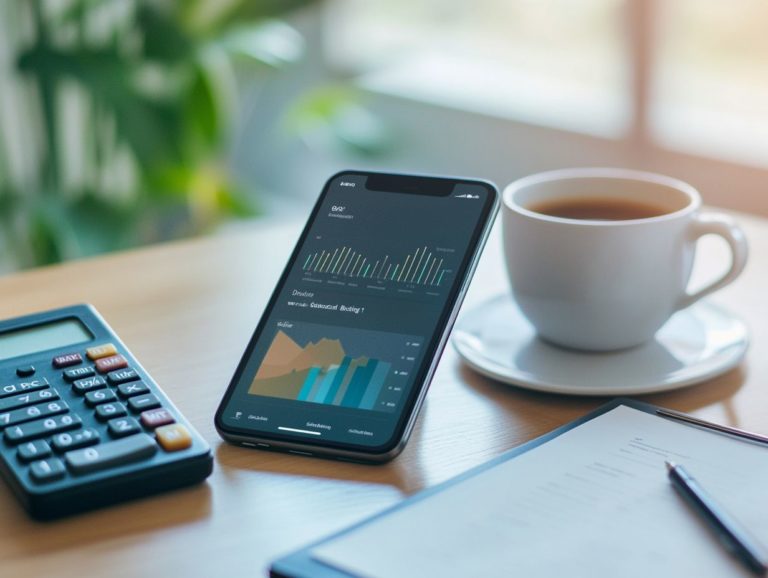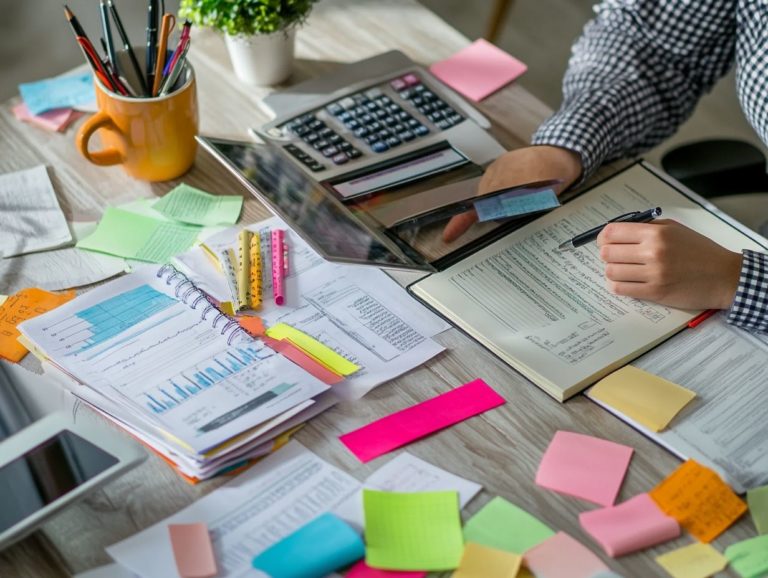What is a Personal Budget?
Managing your finances can often feel overwhelming. Embracing a personal budget can truly be a game-changer. It s not merely about tracking what you earn and spend; it s about seizing control of your financial future.
This article delves into the definition and significance of personal budgets. It guides you through the creation process with effective strategies. You ll find tools for tracking your expenses and income, as well as invaluable tips to help you stay on course with your budget.
It also highlights the benefits of maintaining a budget while steering clear of common pitfalls.
Transform your financial habits today! Together, we ll secure your future!
Contents
- Key Takeaways:
- Understanding Personal Budgets
- Creating a Personal Budget
- Tracking Expenses and Income
- Sticking to a Personal Budget
- Benefits of Having a Personal Budget
- Common Mistakes to Avoid
- Frequently Asked Questions
- What is a Personal Budget?
- Why is having a Personal Budget important?
- How do I create a Personal Budget?
- What are the benefits of using a Personal Budget?
- Are there different types of Personal Budgets?
- Can a Personal Budget change over time?
Key Takeaways:
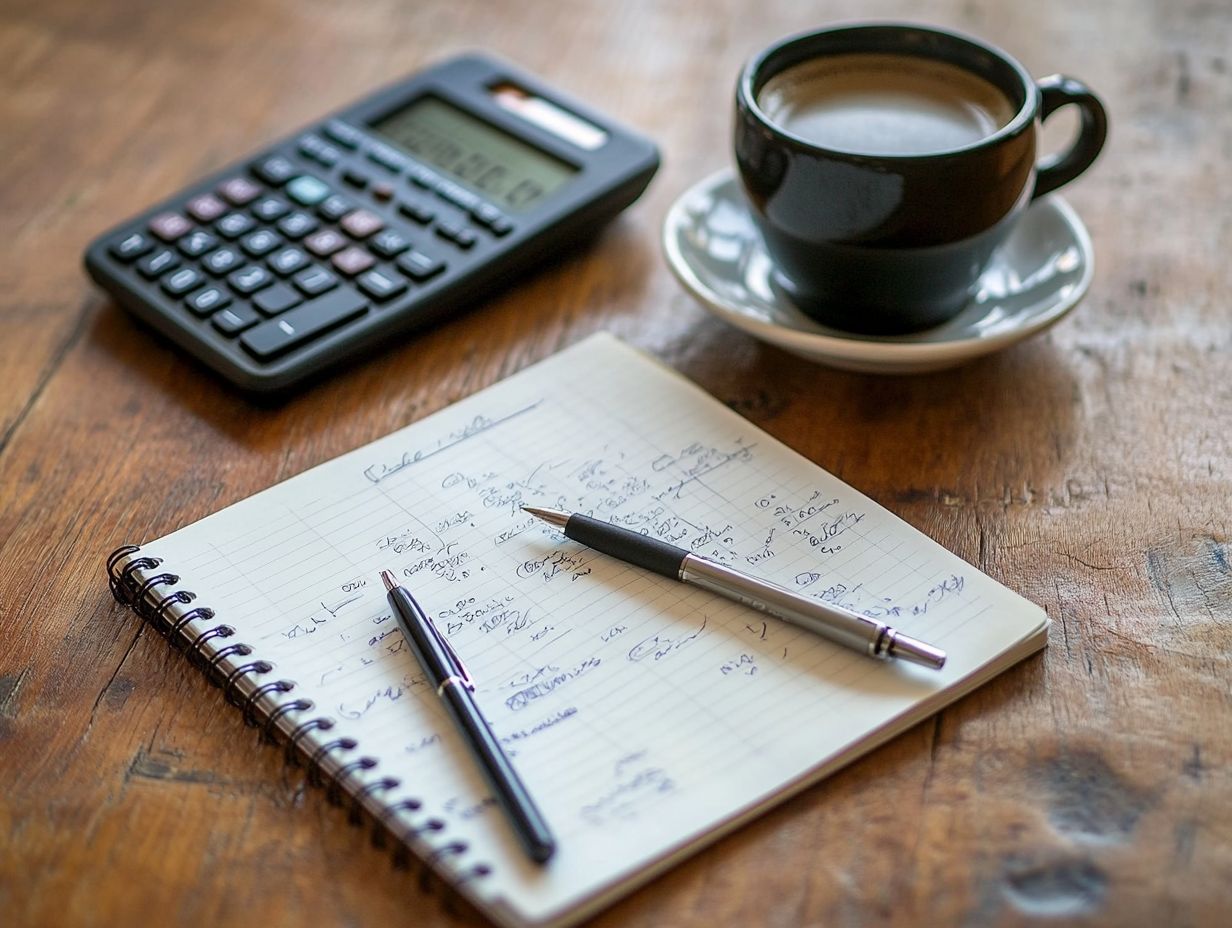
- A personal budget is a financial plan that helps individuals track and manage their expenses and income.
- Creating a personal budget involves setting clear goals, prioritizing expenses, and finding strategies to save money.
- Tracking expenses and income using tools like budgeting apps and methods like the 50/30/20 rule where you allocate 50% of your income to needs, 30% to wants, and 20% to savings can help individuals stick to their budget and achieve financial stability.
Understanding Personal Budgets
Understanding personal budgets is essential for attaining financial control and stability. It enables you to gain insight into how you allocate your income and manage household expenses.
A well-structured personal budget serves as a tool for tracking your spending. It helps uncover any financial leaks and fosters disciplined habits that align with both your short-term and long-term goals.
By concentrating on specific categories of expenses, you can prioritize your needs and desires effectively. This sets the stage for successful financial planning and enhances your financial awareness over time.
Definition and Importance
A personal budget serves as your financial plan, detailing expected income and expenses. It’s essential for managing your finances effectively and achieving your financial aspirations.
By crafting a personal budget, you can gain clarity about your financial landscape. This helps you pinpoint unnecessary expenditures and prioritize your spending. This structured approach aids in setting realistic financial goals, like saving for that dream vacation or investing in your education. It also helps you avoid the pitfalls of overwhelming debt.
Utilizing budgeting resources, such as apps or spreadsheets, can streamline the budgeting process. Various strategies encourage you to regularly evaluate and adjust your plan. By leveraging these tools, you can sidestep common budgeting blunders, such as underestimating expenses or overlooking irregular costs. This ultimately leads to more effective and sustainable financial management.
Creating a Personal Budget
Creating a personal budget requires a well-structured approach. Begin by understanding your income sources. Then, categorize your expenses into fixed and variable.
This thoughtful allocation of funds to various budget categories will set you on the path to financial clarity and control.
Steps and Strategies
To create an effective personal budget, follow these key steps and strategies:
- Utilize a budget worksheet.
- Define clear financial goals.
- Establish an emergency fund.
- Categorize your income and expenditures to visualize where your money is flowing.
- Track your spending habits to pinpoint unnecessary expenses that can be trimmed.
- Consider various budgeting methods, such as the 50/30/20 rule or zero-based budgeting, tailored to fit your unique financial situation.
- Review and adjust your budget periodically based on changes in income or living circumstances.
Regularly assessing your budget enables better financial choices and nurtures a sense of control over your financial future.
Tracking Expenses and Income
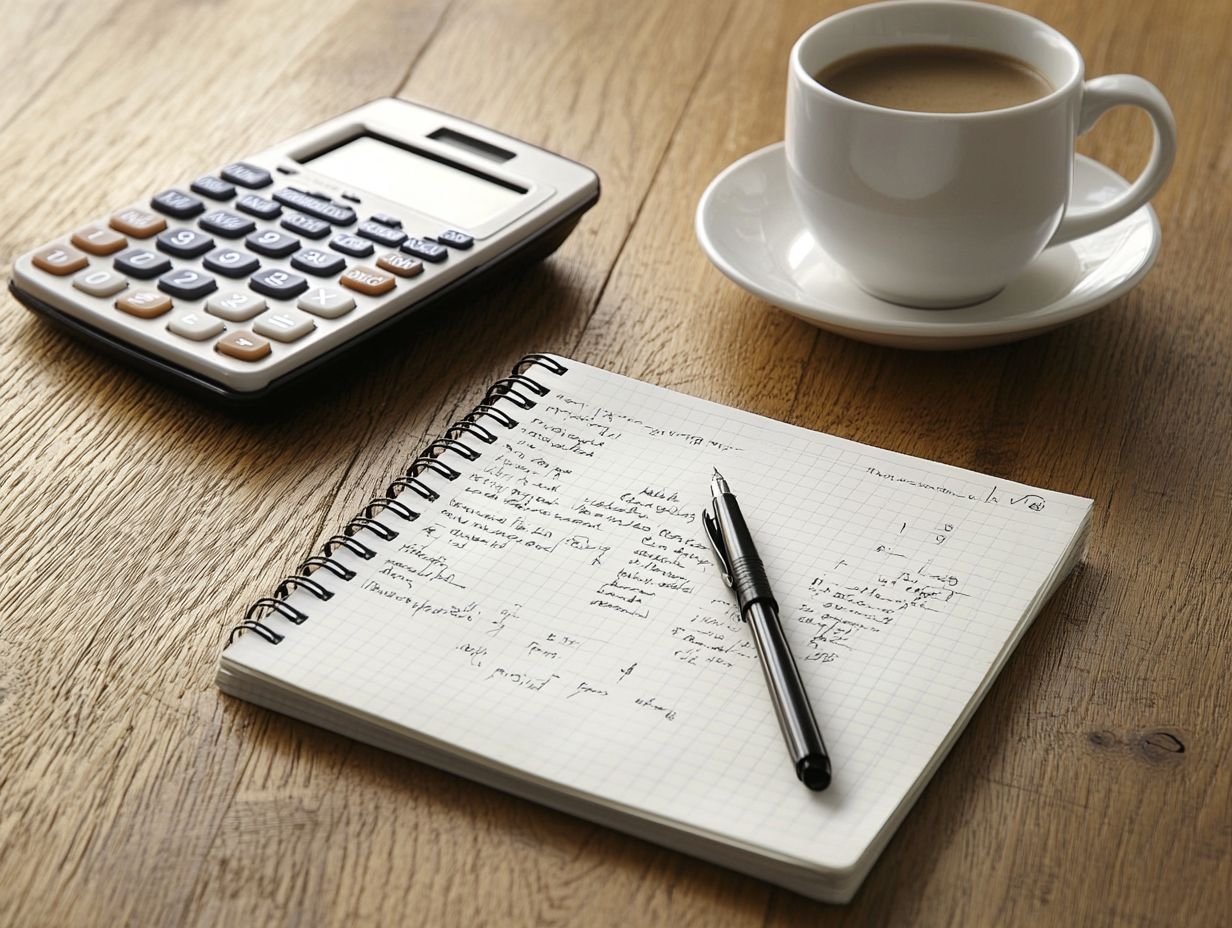
Tracking your expenses and income is key to maintaining a personal budget. It helps you keep an eye on your monthly expenditures and uncover spending patterns that could influence your financial goals.
Start your budgeting journey now download a free budgeting app and take the first step towards financial freedom!
Tools and Methods
You have a wealth of tools and methods at your disposal for tracking expenses and income, including budgeting resources like cash budgeting techniques and various financial software applications.
Among these options, you might discover that spreadsheet templates provide a versatile way to manage your finances manually, allowing for customization tailored to your specific financial goals. Alternatively, mobile apps offer the convenience of real-time updates and alerts, ensuring you remain acutely aware of your spending habits.
Each approach has its pros and cons. For instance, while cash budgeting can instill discipline and offer immediate insights into cash flow, it may not be the best fit if you primarily engage in digital transactions. On the flip side, software applications often come equipped with features that analyze spending trends, although they might present a steep learning curve.
Mastering your income allocation now can lead to better financial security! By understanding how to set aside money for savings and covering essential expenses, you can cultivate stronger budgeting discipline while keeping a close eye on discretionary spending.
Sticking to a Personal Budget
Maintaining a personal budget demands good budgeting habits and a steadfast commitment to financial discipline. You can achieve this by conducting regular budget reviews and pinpointing any spending leaks that may be undermining your efforts.
Tips for Maintaining Discipline
Maintaining discipline in your personal budget can be a challenge, but with the right tips and resources, you can elevate your financial control to new heights.
- Start by setting realistic goals; this will give you a clear direction for tracking your expenses and savings.
- Regularly review your spending habits. Monthly summaries reveal where adjustments are necessary.
Budgeting apps can simplify the tracking process and provide valuable insights into your spending behaviors. Consider setting aside money for savings to help curb those impulsive purchases and promote adherence to your financial plan.
Bringing a partner or family member into the mix can add a layer of accountability, making it easier to stay on track. It s essential to revisit and adjust your budget periodically to accommodate any changes in income or unexpected expenses.
Benefits of Having a Personal Budget
Maintaining a personal budget brings a wealth of advantages, such as better financial stability, increased control over your finances, and the opportunity to adopt effective saving strategies that support both your immediate and future financial aspirations.
Financial Stability and Future Planning
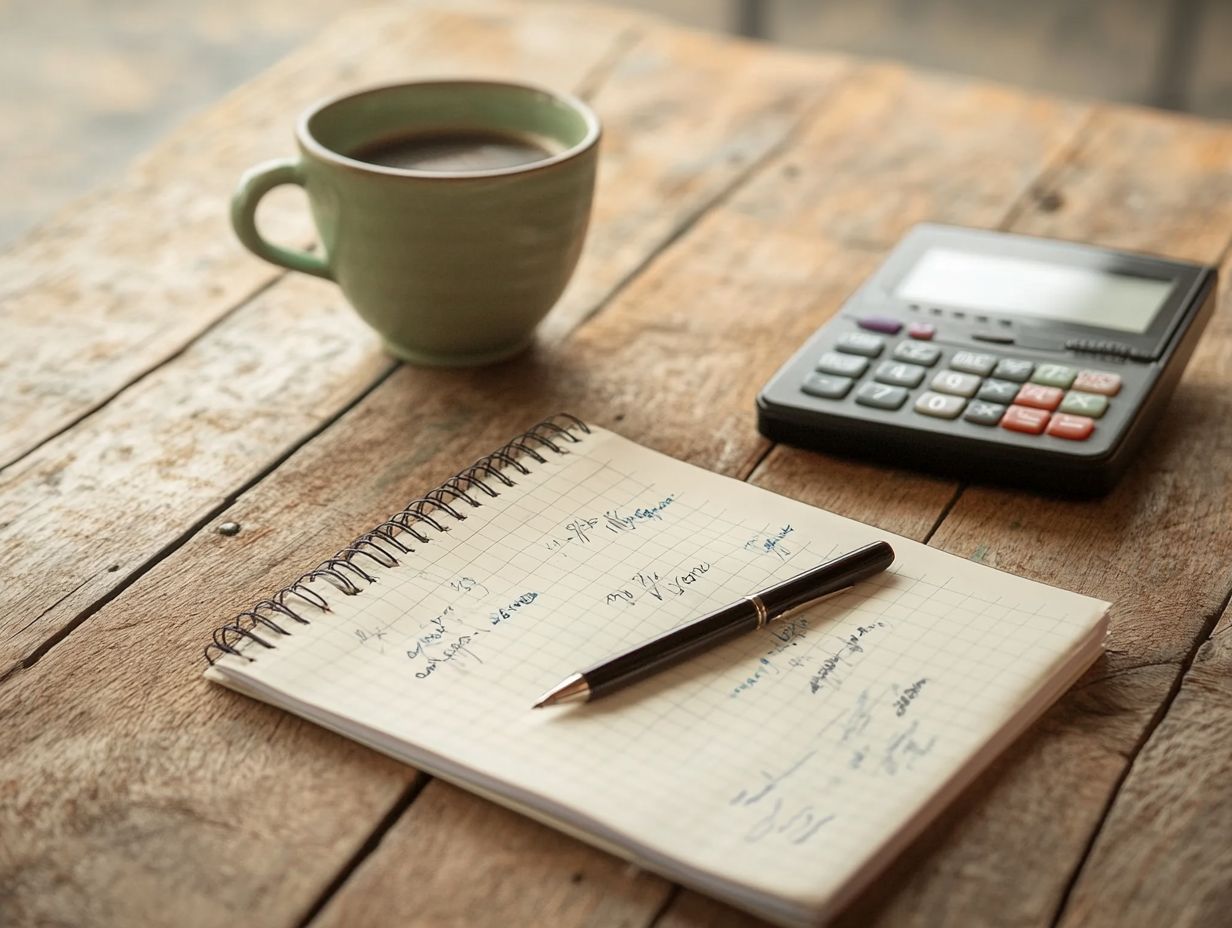
Personal budgets serve as your blueprint for achieving financial stability and planning for the future, enabling you to set and attain your financial goals while building a solid emergency fund.
By keeping a clear overview of your income and expenses, you can pinpoint areas where savings are possible and strategically allocate those funds toward retirement savings and unforeseen expenses. This proactive strategy not only creates a financial buffer for unexpected emergencies but also facilitates consistent contributions to your retirement accounts, which are crucial for long-term wealth accumulation.
A well-structured budget fosters disciplined spending, ensuring that your choices today align with your aspirations for a stress-free retirement and ultimate financial independence tomorrow.
Common Mistakes to Avoid
Avoiding common budgeting mistakes is crucial for enhancing your financial capability and effectively managing your income and expenses throughout the budgeting process. By steering clear of these pitfalls, you enable yourself to make informed decisions that pave the way for greater financial stability and success.
Start budgeting today to secure your financial future and enjoy peace of mind!
Budgeting Pitfalls and How to Overcome Them
Avoid common budgeting pitfalls to take control of your finances today! Being mindful of budgeting pitfalls, such as neglecting extra spending money or underestimating debt management needs, is essential for maintaining a robust personal budget.
Many people tend to overlook these aspects. This can lead to overspending and unforeseen financial pressure. Failing to track smaller purchases can create a deceptive sense of security regarding available funds.
Put a monitoring system in place to heighten your financial awareness and stay in tune with your spending habits. Regularly reviewing your budget allows for necessary adjustments, ensuring that all expenses no matter how trivial they may seem are accounted for.
Setting aside a specific amount for extra spending money can help you navigate these challenges, providing a structured approach to spending while cultivating healthier financial habits.
Frequently Asked Questions
What is a Personal Budget?
A Personal Budget is a financial plan that outlines an individual’s income, expenses, and savings goals. It is a tool that helps people manage their money and make informed decisions about their finances.
Why is having a Personal Budget important?
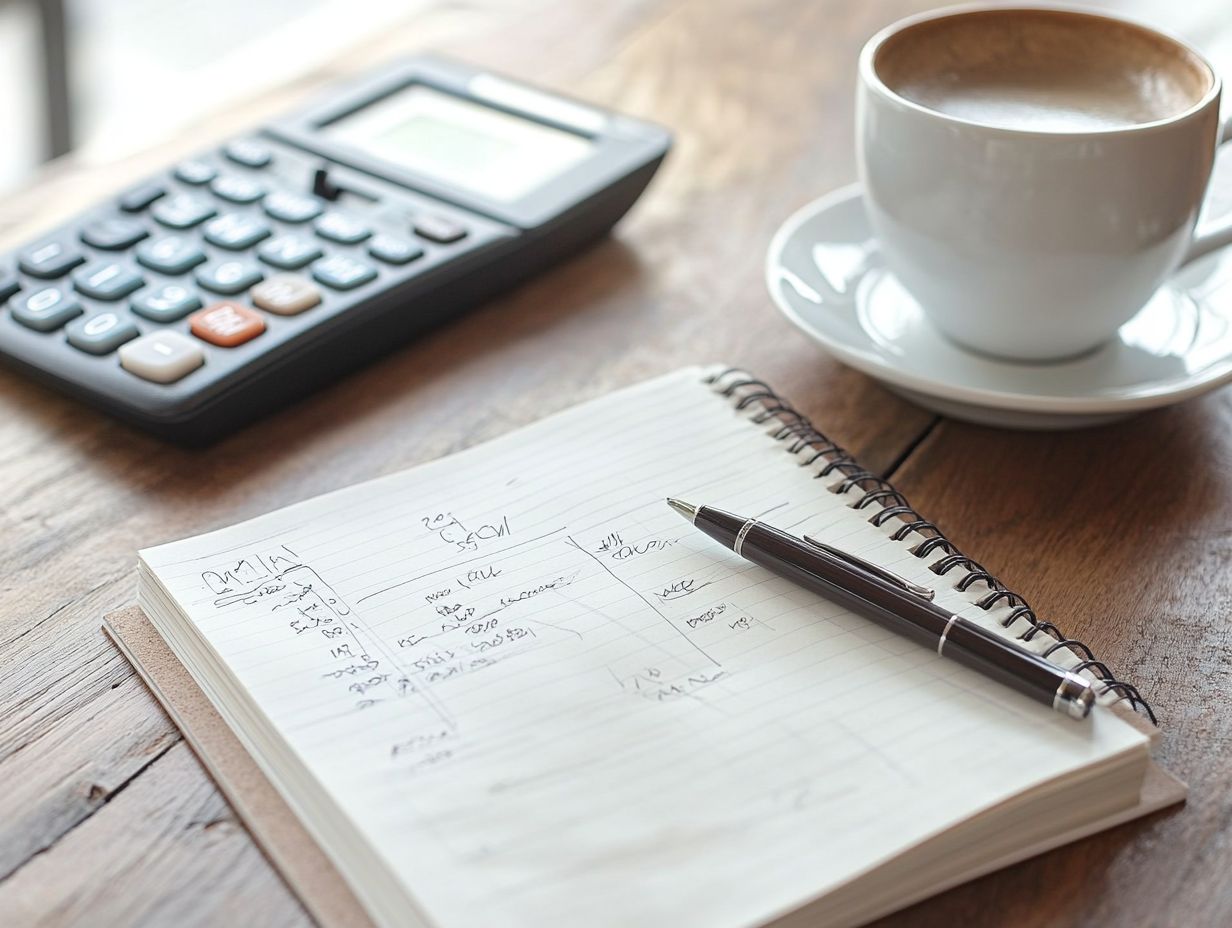
Having a Personal Budget is important because it allows you to track your spending, identify areas where you can save money, and reach your financial goals. It also helps you stay organized and avoid overspending.
How do I create a Personal Budget?
To create a Personal Budget, you will need to gather all your financial information, including income, expenses, debts, and savings. Then, you can use a budgeting worksheet or an online budgeting tool to help you allocate your money according to your needs and goals.
What are the benefits of using a Personal Budget?
Using a Personal Budget can help you gain control over your finances, reduce debt, and save money for future expenses. It also allows you to make more informed decisions about your spending habits and prioritize your financial goals.
Are there different types of Personal Budgets?
Yes, there are different types of Personal Budgets, such as a traditional budget, a zero-based budget, and an envelope budget. Each type has its own approach, but they all serve the same purpose of helping you manage your money effectively.
Can a Personal Budget change over time?
Yes, a Personal Budget can change over time as your income, expenses, and financial goals change. It is important to regularly review and adjust your budget to ensure it reflects your current financial situation and helps you reach your goals.
Ready to take control of your finances? Start budgeting today!

